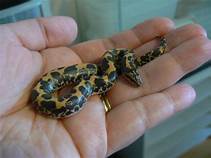What is the Smallest Snake for a Pet?
Snakes are fascinating and unique creatures that can make great pets. However, not all snakes are created equal. Some snakes can grow to be very large, while others stay relatively small. If you're looking for a small snake as a pet, there are a few things you'll need to keep in mind.

Factors to Consider When Choosing a Small Snake Pet
When choosing a small snake as a pet, there are a few factors you'll need to keep in mind. These factors include:
- Size: How big do you want your snake to be?
- Temperament: Some snakes are more docile than others.
- Activity level: Some snakes are more active than others.
- Lifespan: How long do you want to keep your snake?
- Diet: What kind of food does the snake eat?
- Housing: What kind of enclosure will you need for your snake?
Smallest Snake Species
There are a number of small snake species that make great pets. Some of the most popular include:
- Pygmy Python: This snake typically grows to be between 18 and 24 inches long.
- Rosy Boa: This snake typically grows to be between 24 and 30 inches long.
- Corn Snake: This snake typically grows to be between 36 and 48 inches long.
- Ribbon Snake: This snake typically grows to be between 18 and 24 inches long.
- Ringneck Snake: This snake typically grows to be between 12 and 18 inches long.
Caring for Small Snakes
Caring for a small snake is relatively easy. However, there are a few things you'll need to do to keep your snake healthy and happy. These things include:
- Provide a proper enclosure: Your snake will need an enclosure that is large enough for it to move around comfortably. The enclosure should also be secure and escape-proof.
- Maintain the proper temperature and humidity: Snakes are cold-blooded animals, so they need a warm environment to thrive. The ideal temperature for most snakes is between 75 and 85 degrees Fahrenheit. Snakes also need a humid environment, so you'll need to mist the enclosure regularly.
- Feed your snake a healthy diet: What you feed your snake will depend on the species of snake you have. However, most snakes eat live or frozen prey.
- Provide fresh water: Your snake will need access to fresh water at all times.
- Handle your snake regularly: Snakes are not naturally social animals, but they can learn to tolerate being handled. Handling your snake regularly will help it to become more comfortable with you.
- Take your snake to the vet for regular checkups: Your snake should be seen by a veterinarian at least once a year for a checkup. This will help to ensure that your snake is healthy and that it is receiving the proper care.
Owning a small snake can be a rewarding experience. By following these tips, you can help to ensure that your snake has a long and healthy life.
Declaration: All article resources on this website, unless otherwise specified or labeled, are collected from online resources. If the content on this website infringes on the legitimate rights and interests of the original author, you can contact this website to delete it.






